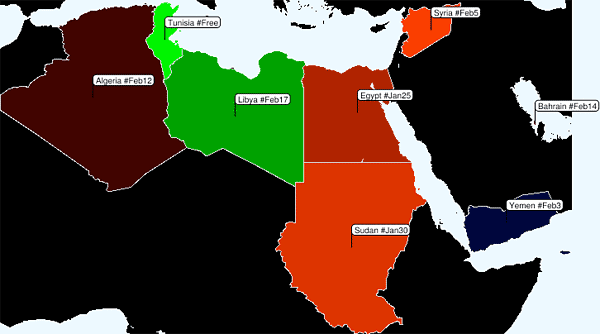Kurt Nimmo
Infowars
Bloomberg warns today that an act of sabotage or a decision by a new regime – possibly headed up by the Muslim Brotherhood – to close the canal and its oil pipeline to punish supporters of Egyptian dictator Hosni Mubarak could send oil prices through the stratosphere.
Egyptian troops currently guard the canal and its adjacent Suez-Mediterranean oil pipeline but that does not mean the flow of oil – more than 1.7 millions barrels per day – cannot be shut down.
About 2.5 percent of global oil production moves through Egypt via the Suez Canal and the Suez-Mediterranean Pipeline, according to Goldman Sachs.
From 1967 until 1975, Egypt kept the canal closed in response to Israel’s seizure of Arab territory, forcing tankers to travel around the Cape of Good Hope.
Earlier today, investors increased bets that oil prices will likely increase as much as $250 a barrel on concern the unrest in Egypt will shut down the flow of oil through the Suez Canal and spread to Saudi Arabia.
On January 28, Lindsey Williams told Alex Jones the situation unfolding in Egypt is a carefully engineered event instigated by the global elite as part of a plan to bankrupt the United States and send shock waves through the global economy.
In December, Williams told Jones that his insider connections said the price of oil will soon skyrocket to between $15-200 per barrel and this price increase will result in gasoline in the range of $4-5 per gallon.
Williams became a friend and trusted confidant of oil industry executives while serving as chaplain for them and their construction crews building the Alaska pipeline in the 1970s.
Market analysts are unsure how the current crisis will impact oil and the global economy. Robert Halver, from Baader Bank, compared Egypt to a raging volcano. He argued that the recent developments are ominous. Halver said that many experts fear the crisis may expand to other Arab states, which would lead to a decrease in oil supplies and an inevitable rise in prices, as Lindsey Williams predicted last year.
Several Arab states have announced plans to launch “Days of Rage” across the Middle East and Africa. See the map below for details.
“When the revolution comes, everyone will be prepared. At least in Northern Africa and the Middle East, where upsurges of optimism from the increasingly successful revolts in Tunisia and Egypt have led other nations’ oppositions to plan dates for their own,” writes Jason Ditz.
“Activists looking for democratic reforms in Syria and Sudan have begun to organize on Facebook and other social media outlets,” Earth Times reported on January 31. “A smaller group in impoverished Yemen also formed on the social media website.”
Algeria experienced five days of protests late last month and tens of thousands took to the streets in Yemen. Similar scenes played out in Jordan and elsewhere. “Undoubtedly, from Algeria to Yemen, the protesters have been emboldened and inspired by the Tunisian example,” the New Straits Times reported on January 29. The Tunisian protest and the downfall of the 23-year-rule of Zine El Abidine Ben Ali began after a young Tunisian set himself ablaze.
It is now obvious the timely emergence of ElBaradei and the Muslim Brotherhood on the chaotic political scene in Egypt was orchestrated by the global elite, as alluded to by Steven A. Cook, writing for the Council on Foreign Relation’s Foreign Affairs.
“The classic gambits of class-warfare, religion, and race seem to be tools well-oiled and working as smoothly as ever in the hands of the globalists as they dismantle their old ally in Egypt and prepare to replace him with their new man, Mohamed ElBaradei,” writes Tony Cartalucci. “If it is true that the Muslim Brotherhood is also a western intelligence front, it is no surprise then that they have come to support ElBaradei’s ‘National Front for Change’ or that they are fomenting similar unrest in Jordan, Yemen, Saudi Arabia and beyond, all with the Brookings Institute, CFR and other globalists’ gleeful encouragement.”
As Cartalucci notes, the tip off should be ElBaradei’s presence on the Board of Trustees of the Zbigniew Brzezinski/George Soros globalist think-tank, the International Crisis Group.
Mohamed ElBaradei, then literally sitting on the International Crisis Group’s Board of Trustees with the likes of George Soros, would not only be a trusted candidate to sow instability throughout Egypt, but would make an equally trustworthy leader of a pliable proxy regime to turn against Iran, Russia, and China. An ElBaradei controlled Egypt could equally be turned against disruptive members of the other globalist pet project Egypt is conveniently positioned to deal with, the African Union. And last but not least, Egypt controls the Suez Canal. Greater control over Egypt means greater control over the passage of freight through the canal.
ElBaradei and the Muslim Brotherhood, at the behest of the globalists, may indeed close down the Suez Canal, as some observers fear, and send the price of oil skyrocketing into outer space as long predicted by Lindsey Williams and others.
–
Kurt Nimmo edits Infowars.com. He is the author of Another Day in the Empire: Life In Neoconservative America.
RELATED ARTICLE:
The Pharaoh Will Fall, Oil Will Rise, and Wall Street Will Win



Be the first to comment on "Days of Rage, Oil Prices, and the Suez Canal"